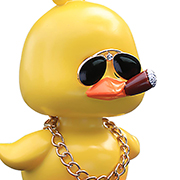|
Zola posted:I also agree Rory Turnbull isn't dead, but given the hatred his mother-in-law Winnie Norton has for him, I'm thinking she's got something to do with this. Not to quote myself, but I don't know if anyone saw this post because no one said anything. If Barbara Turnbull was the addict, she might have used Rory's access to both the office and the club to forge herself checks. The drugs might have been planted to make it look like Rory was a drug addict, since it was so amateurish. His disappearing and faking the drugs and the suicide note would make it possible for Barbara Turnbull to put all the blame on Rory. Zola fucked around with this message at 15:08 on Jul 11, 2013 |
|
|
|

|
| # ? Jun 5, 2024 07:04 |
|
Awesome, lots of good discussion! I'm going to give this a little more time since I don't want to interrupt, but just to let you know I am reading and will provide an update when it looks like everyone is settled.
|
|
|
|
]I've been on and off this book, but I do agree that Barbara was the one with the addiction and Rory ran off to get away from her and be with Tanya. Don't really have an opinion on the rest of it though, but I might do another read-through if there's time.
Mecca-Benghazi fucked around with this message at 23:59 on May 2, 2013 |
|
|
|
Do we really need spoiler tags at this point? We've all read through this section. Chief Suspects: Rory, Tanya, Dylan, Barbara. Points that need explanations: Sam Kent's murder, Dylan visiting the corpse, Rory's faked suicide, Rory's planted drugs. Assuming Rory was the culprit: Sam Kent's murder: Any number of motivations. If Sam Kent is the supplier, then his motivation could be related to his own drug habit or his wife's drug habit, whichever has one. Dylan visiting the corpse: Whichever Turnbull is a druggie, Rory's been in contact with Dylan about the heroin. But why would he go mutilate the body? Faked suicide: Trying to get away before the police find him. Planted drugs: I have no explanation. Assuming Dylan was the culprit: Sam Kent's murder: I have no explanation. Dylan visiting the corpse: Getting his friends to write their names on it to deflect suspicion away from himself. Faked suicide: Rory could have done this independently to escape from his marriage. Planted drugs: Dylan could have done this to deflect police, but why would he deflect them in two different directions? It doesn't add up. Also, we don't have any proof of a way Dylan could have accessed Rory's home. Assuming Barbara was the culprit: Sam Kent's murder: Drugs-related. Dylan visiting the corpse: If Rory is getting drugs for Barbara, then I guess this could explain how he's connected to it? Shaky logic. Faked suicide: Rory getting away from his crazy drug-addict wife. Planted drugs: She has access to his study. Could be a gambit to deflect suspicion away from herself. Assuming Tanya was the culprit: Sam Kent's murder: Tanya's an addict, so drugs-related if we assume Kent is the supplier. Unclear, though. Dylan visiting the corpse: I have no explanation. Faked suicide: Rory trying to elope with Tanya. Could they be in it together? Planted drugs: I have no explanation. Ugh. Unless someone has more to add, I'm going to throw my hands in the air and guess that it's Barbara Turnbull. I don't know if we're overlooking something or if this isn't solvable. Quinn2win fucked around with this message at 03:03 on May 6, 2013 |
|
|
|
Here's my final theory 1) Jude is a false identity because she is either working undercover or is assisting the police. Brad is her contact 2) Barbara Turnbull is the one with the drug problem. She is probably the one who forged the checks, using her husband's access. She planted the drug paraphernalia for her mother to discover. Dylan was most likely her local supply. 3) Rory Turnbull hid Sam Kent's body in his boat. Whether Sam overdosed, fell overboard or was killed, Rory didn't want him found or recognized so he hid the body in his boat and removed his fake tooth. 4)Dylan was surprised to find the body in the boat according to Nick. It's possible that he tried to blackmail Rory with the knowledge. Dylan might have killed Aaron and made it look like a suicide. It's possible that Aaron realized it was Nick's father and threatened to go to the police.
|
|
|
|
Okay, time to lock in. My theory stands pretty much as it is. Rory and Tanya were smugglings drugs with Sam. Sam was believed to be dead and temporarily left behind by Tanya and Rory. Dylan and the boys found him (still doubting that this was coincidential but I've got nothing to go on). They woke him up with their "ritual" which lead to Sam's death by drowning in the Fether. I'd think they chucked him into the river themselves but that wouldn't explain why Aaron checked the boat first next day. Thus I believe it was either Sam who accidentially fell into the river himself or somebody came back and pushed him in. My suspicion is that Dylan killed Aaron so I'll just go ahead and say that Dylan killed Sam as well. I'll admit there's many other possible theories and some of them probably better but like some of the others I'm ready to see the solution.
|
|
|
|
Okay! So I think that has been a sufficient amount of time; lots of good discussion and interesting theories. Please read through to the end.
|
|
|
|
No victory for me this time.  None of us came up with the idea of Sam Kent as a body double to complete the suicide scheme. I almost said that Rory and Tanya were in cahoots, but... What was the planted drugs bit about? Did we ever get an explanation for that? Was EVERYTHING related to Dylan a red herring? Quinn2win fucked around with this message at 06:12 on May 5, 2013 |
|
|
|
Well I certainly am glad my entire theory was based on Sam's loving lifewest.  ProfessorProf posted:
|
|
|
|
ProfessorProf posted:No victory for me this time. Sure looks that way. The only things I got right was that Rory killed Sam (and I don't take full credit because I wasn't entirely sure if Sam was killed or died accidentally), and that Rory wasn't a drug addict.
|
|
|
|
So! Next book, then. On the list: The Moving Finger, by Agatha Christie. I'd be down with running this round, my brain could use a break. Crooked House, by Agatha Christie. I forget who suggested this one. Pit Prop Syndicate, by Freeman Wills Crofts. I'd probably sit this out, I can't follow Crofts's prose. She Died a Lady, by John Dickson Carr. I don't know if we have anyone in this thread who's read it. I got the rec from the What Book Did You Just Finish thread.
|
|
|
|
Man, you guys were hovering so close. That is why I wanted the discussion to keep going. As soon as I saw you guys talking about the teeth and Rory being a dentist I thought you had it (although on further reading, it looks like there was no mention in his confession about matching up the dental records? So maybe I just inserted that bit in in my memory, it seemed obvious to me at the time). In either case it was a valiant effort, you were able to narrow things down just not close everything out. I couldn't myself on my read through either. I am fine with whatever book. I might end up sitting this one out as I am getting married this month and planning is starting to kick my butt. But I will try to keep up if I can!
|
|
|
|
Congrats on getting married.  I don't know why it never occurred to me that Rory framed himself. I got the relationship between Tanya and Rory but that was telegraphed to hell. I hope Tanya and her kid end up all right.
|
|
|
|
ProfessorProf posted:So! Next book, then. On the list: I'm new to this thread and really want to join. Can I vote for an Agatha Christie (which seems to be an easy introduction to mystery/detective fiction)?
|
|
|
|
Love reading this thread. I can't participate because I've read all books on the list, but reading the discussion and reactions is really fun. ProfessorProf posted:So! Next book, then. On the list: Out of those, She Died a Lady and Crooked House are the best ones. I would recommend "She Died a Lady" because John Dickson Carr has a very interesting approach when it comes to murder mysteries. He writes and treats them like a game between the reader and the writer(he even wrote an excellent essay called "The Grandest Game in the World" about the subject and if anyone is interested I can ramble about this for hou--okay days) which makes it perfect for this thread. Christie's style goes for a bit more style and flair than Carr but that's not a bad thing really, it's just a matter of preference. As far as difficulty goes, I think She Died a Lady is definitely the tougher one of the two if you are reading it normally...but considering the thread format, Carr's preference for dramatic challenges is going to make it a bit easier to solve. Crooked House is an excellent book too though, I just personally prefer Carr's style. Grawl posted:I'm new to this thread and really want to join. Can I vote for an Agatha Christie (which seems to be an easy introduction to mystery/detective fiction)? Christie is the most famous(nowadays) but I think Carr would work better as an introduction to be honest. Christie got famous by twisting mystery conventions so seeing them be played straight before seeing her twisting them could be pretty useful.
|
|
|
|
Sherringford posted:Love reading this thread. I can't participate because I've read all books on the list, but reading the discussion and reactions is really fun. Would you be interested in running She Died A Lady for us? If not, I could read it to run it later, but it would take me a couple days.
|
|
|
|
ProfessorProf posted:Would you be interested in running She Died A Lady for us? If not, I could read it to run it later, but it would take me a couple days. Sure, I would love to! Just to make sure I'm not forgetting anything, I'd basically just have to select stopping points and post a clue summary right?
|
|
|
|
Sherringford posted:Sure, I would love to! Just to make sure I'm not forgetting anything, I'd basically just have to select stopping points and post a clue summary right? Even the latter is not required - I just did it in the first round to keep discussion moving. All you have to do is control the pacing of the mystery for us, then laugh at us if we get it wrong in the end.
|
|
|
|
Alright, cool, I'm excited already. Just need to finish my current (e-)book, but with about 100 pages left that should take a day or so.
|
|
|
|
ProfessorProf posted:Even the latter is not required - I just did it in the first round to keep discussion moving. All you have to do is control the pacing of the mystery for us, then laugh at us if we get it wrong in the end. Sounds great then! I don't mind making a character list and clue summary so I'll probably try to include that. I just skimmed the book on my kindle app and it seems like controlling the pacing of the mystery is gonna be pretty easy, I almost forgot how well constructed the book was. We can get started as soon as everybody is ready. She Died a Lady is on the kindle store for $6.30, so it should be pretty easy to find(the print version is a bit more expensive but it's pretty easy to find too).
|
|
|
|
Sherringford posted:Sounds great then! I don't mind making a character list and clue summary so I'll probably try to include that. I just skimmed the book on my kindle app and it seems like controlling the pacing of the mystery is gonna be pretty easy, I almost forgot how well constructed the book was. We can get started as soon as everybody is ready. Wonderful, fetching it now so I'm ready whenever you all are 
|
|
|
|
Ready! So excited Sherringford is running this.
|
|
|
|
Book acquired, ready to engage. What chapter should we stop at first?
|
|
|
|
Alrighty then, seems like we have enough people ready to start. For the first assignment, let's read chapters 1-4. This book has pretty short chapters and this is pretty much the best place to stop. I have a character list prepared already but I'm going to wait until the next batch of chapters to post it for simplicity's sake.
|
|
|
|
OP updated for new book. Let's do this.
|
|
|
|
Bit late for the discussion of the previous book, but I only got around to finishing it this morning. Man, I can't believe I didn't guess that Tanya was pregnant. Other than that, I was sort of half-right in that Tanya was involved. Will order new book from Amazon today 
|
|
|
|
Finished our first assignment. Initial musings and central characters follow. Luke Croxley: The narrator, but certainly not the detective. An older gentleman and a doctor. His heart doesn't seem to be in good shape. Alec Wainright: Gentleman of an age similar to Luke's, I think. Married to Rita Wainright. Aware that she's cheating on him, in a panic about the war. Alcoholic. Rita Wainright: Younger, in her thirties. Married to Alec. Having an affair with Barry Sullivan, a fact known by at least Alec and Luke. Victim number one. Barry Sullivan: American, in his twenties. Having an affair with Rita. Actor of questionable prospects. Victim number two. Merrivale: Our yet-to-be introduced sleuth. The last line of chapter 4 makes me confident that the victims didn't die by falling. Lover's Leap was a cover story from the culprit to make the murder look like a suicide. This is a classical whodunnit, so suicide is off the table as a possible explanation. Alec was acting strange on the night of the incident. He seemed somehow half drunk and half sober, as he kept rambling about the telephone wires and Johnson. What was going on there? Even stranger is Rita's behavior at the start of chapter 4. Was she drugged? I have no idea what to make of it. This is going to be an interesting read, I can tell. Quinn2win fucked around with this message at 19:34 on May 7, 2013 |
|
|
|
Actually going to try to participate in this one, sorry for bailing last time. Life got busy (and I also left the country for a bit.)
|
|
|
|
Good summary Prof. Also of note is that Merrivale seems to be Tom's patient and Tom is our protagonist's son and also a doctor. Alec seems to think that the gardener, Johnson, cut the telephone wires. How the lines will tie in, I don't know. I almost want to say the culprit probably cut them to prevent them from calling the police, so they would have to leave the house to tell the police. Obviously we haven't been introduced to all of the characters yet, but one suspect in my mind is Molly, the girl who was going around with Barry. Mecca-Benghazi fucked around with this message at 03:42 on May 28, 2013 |
|
|
|
A part of me wants to rush and give the next assignment already, but I think I'm going to give people some more time to catch up since some people are probably still buying the book and all. It's probably worth noting I just finished pacing the rest of the book, so there's that. Question: Would people be interested in "pointless mystery trivia about the writer" just to give some background about his writing style in-between assignments or would I be just cluttering the thread with needless details?
|
|
|
|
Sherringford posted:Question: Would people be interested in "pointless mystery trivia about the writer" just to give some background about his writing style in-between assignments or would I be just cluttering the thread with needless details? This sounds like fun. Go for it.
|
|
|
|
I started reading the book today, I'll finish the assignment later today or tomorrow.
|
|
|
|
ProfessorProf posted:This sounds like fun. Go for it. In that case, here I go! Before I start I should probably note I'm writing this as I go and I don't have my entire collection with me at the moment, so a lot of this comes from memory. I may have made a mistake or two here. In any case... John Dickson Carr: A Quickish Summary Mystery writing used to get the same treatment fantasy(sometimes) gets nowadays, with some particularly annoying critics denying that they could ever have any literary value and some writers with far too much time in their hands angrily countering those points with numerous essays. John Dickson Carr had a bit of a peculiar take on the issue which is what(I assume) makes his writing style so different from even other Golden Age writers. Rather than arguing that mystery fiction could have literary value he held the firm belief that works that aimed for literary value were boring as hell. In the preface to "The Devil in Velvet (1951) Carr wrote that "The first duty of any novelist, a duty so often forgotten nowadays, is to tell a story." This belief that a story should be fun above everything else was something he emphasized quite a lot during his(ridiculously productive) career and earned him quite a few critics. Raymond Chandler could be considered Carr’s polar opposite in that regard, but more on their contrast later. Carr never engaged in the debate of whether mystery writing had any sort of literary value because he was borderline apathetic to the very idea of literary value in itself. He goes as far as to refer to mystery novels as "the noblest form of relaxation from academic work” and relinquish any sort of literary value or social commentary they might have. That is curiously not to say that his novels didn’t occasionally address(if only in passing) some social issues of the time, as he often portrayed taboo subjects(such as female sexuality) with an attitude that can best be described with “Eh, who cares?” It’s probably accurate to say that Carr didn’t avoid social commentary so much as hated the idea of actively trying to create it—if it came about naturally he would not take it out of the story. Here is where I unfortunately need to direct some of you to extra reading—I’m sorry. I will give out the cliffnotes version as I comment on it anyway, but I would recommend reading the material if only because they are incredibly fun to read. The material in question is Raymond Chandler’s essay “The Simple Art of Murder” and John Dickson Carr’s “The Grandest Game in the World.” I bring up those two essays because so strong is the contrast between them that they offer the best way to describe Carr’s style and motivation. Chandler argues that the puzzle-type story is rubbish and that the detective story should focus more on character and society as a whole rather than a puzzle. Carr’s interpretation of the genre was entirely different and borderline romantic: he saw the detective story as a game. He writes: quote:It is a hoodwinking contest, a duel between author and reader. "I dare you," says the reader, "to produce a solution which I can't anticipate." "Right!" says the author, chuckling over the consciousness of some new and legitimate dirty-trick concealed up his sleeve, and then they are at it-pull-devil, pull-murderer-with the reader alert for every dropped clue, every betraying speech, every contradiction that may mean guilt. This is the framework, the skeleton, the foundation of Carr’s style and “literary theory” as so it were. He relinquished any sort of social commentary in exchange for focusing solely on the above—on the idea of anticipating the reader’s every reaction and surprising his predictions. In "The Murder in Number Four" he likens the game to chess while highlighting their differences. "The great chess player is the one who can visualize the board as it will be after his move. The great detective is the one who visualize the board as it has been when he finds the pieces jumbled." He also passionately elaborates on the point of plot versus literary value in the essay, citing that quote:“The "literary" type, like the hard-boiled, is too apt to mistake style for substance. It imagines that with good writing, which sometimes becomes merely pretentious writing, you can disguise the lack of an original plot. Perhaps because of this writing philosophy(it is a bit of a Chicken-and-the-egg question) Carr became famous for the impossible crime novel. Carr’s most famous novels(and frankly, most of his novels in general) focused around crimes where not only was the murderer’s identity a mystery the very murder itself was a seemingly impossible problem. Perhaps the victim was found dead, in a room locked from the inside in a situation that makes suicide impossible, or perhaps there were no footprints giving the impression that the criminal had the ability of flight. The specifics of each story aside, Carr’s “challenge to the supernatural” as it so often seemed followed a strict formula: a murder happens but all evidence suggests it absolutely could not have happened. Then, the reader is posed with the challenge of either reaching the true solution or accepting the solution proposed by less intelligent characters in the novel—that the culprit is either supernatural or some other equally ridiculous theory. Though many writers wrote locked-room mysteries every once in a while(Christie herself who many of you are aware of wrote a few) few writers based their careers around them because of how difficult they were to write. Carr is the acknowledged master of the locked-room genre and affectionately referred to(by the title of his biography) as “The man who could explain miracles.” Carr’s influence in the locked room genre can best be summed up with the famous “Locked-Room Lecture” (spoilers for the stories Professor just mentioned in the post under this one. My bad!) from his masterpiece “Three Coffins” where the detective breaks the fourth wall and delivers an almost academic lecture on both the nature of the locked-room mystery and the many ways to create an impossible crime scene. Hopeford fucked around with this message at 23:51 on May 6, 2013 |
|
|
|
Word to the wary - this excellent essay does contain spoilers for three older mystery stories: The Mystery of the Yellow Room, by Gaston Leroux Initials Only, by Anna Katharine Green The Doomdorf Mystery, by Melville Davisson Excellent post all around, though.
|
|
|
|
Alright, finished the first four chapters. So far someone cut the telephone wires and Rita + Barry (supposedly) threw themselves off the cliff just outsides Alec's house.
|
|
|
|
I hope I can join, too - The atmosphere in the beginning, with the narrator being a doctor in a small town and talking about gossip gives me some "Murder of Roger Ackroyd" vibes. - the feud between Rita and Molly's father is something to have in mind - what did Rita really wanted doctor to do? (before she asked him for pills) Why did she change her mind? - God, there is so much drinking going on, I had to open a Breezer myself, - Rita specifically said that she wants to listen to "Romeo and Juliet" and then apparently they go and jump off the cliff. I know it's a murder, but I wonder... I have several silly ideas about this, but I'll wait for some more clues. And also I have an embarassing question about something I didn't understand and I could use some help: when Rita mentions that she does not know any "J.P.", what does "J.P." stand for? I'm not a native English speaker. I found that it can mean "Justice of the Peace" and I suppose it makes some sense. Is this it?
|
|
|
|
Alright, let's move on to the next assignment. You can unspoil your comments up to this point if you wish. If you are a bit behind, don't worry, the book's chapters are quite short so there's still more than enough time to join. We are going to go with Chapters 5-8. This stretch has so many fun-to-read bits, couldn't resist re-reading it as I was double checking the chapters. Brief character list from chapters 1-4 to get you up to speed if you forgot a detail or two in-between assignments: Character List: [Accurate only in regards to information available to the reader up to chapter 4. Does not contain characters or information from chapters 5-8.] DR LUKE CROXLEY The narrator. He’s an old semi-retired family doctor whose only living relative is his son Dr. Tom—his wife having passed away before the story started. A somewhat grumpy, old fashioned man. DR TOM CROXLEY Dr. Luke’s son and a passionate doctor. His father describes him best: “He is the born country G.P.; he loves his work as I loved it. When Tom goes to see a patient, he gets wrapped up in the case and tells the patient all the imposing medical terms for what’s wrong with him. This impresses and pleases the patient; it inspires confidence to start with.” RITA WAINRIGHT Thirty-eight year old woman married to Alec Wainright and known to have an affair with Barry Sullivan. It was generally accepted by everyone that everyone knew about her affair except for Dr. Luke and Alec. Most importantly, she’s one of the two victims. ALEC WAINRIGHT Sixty-year old man married to Rita. He is known to enjoy alcohol a bit more than he should. He knew of the affair, but pretended not to know—thus making Dr. Luke the only one who didn’t know about it for a long time. He’s a bit of a nervous wreck and has an obsession with the news. In the past, people thought of him as a confident man, but this is no longer the case as the whole situation has taken quite a toll on him. MOLLY GRANGE Described by Dr.Luke as “a straightforward, sensible, pretty girl in her middle twenties. She had the fair hair and blue eyes of her mother, with her father’s practicality.” She is the daughter of Stephen Grange, who is the town’s local solicitor. She’s also the one responsible for introducing Rita to Barry Sullivan. BARRY SULLIVAN A young American man of about Molly’s age who had an affair with Rita. Dr. Luke described him as being rather good looking, “but not offensively so.” SIR HENRY MERRIVALE Said to be a detective of sorts. Currently staying with Paul Ferrars. He has fractured his toe somehow(“He was up to some shenanigans – can’t imagine what—“ as described by Tom) and was examined by Dr. Tom. He also supposedly swears a whole lot and will be kept in a wheelchair for six weeks at least. PAUL FERRARS So far known only to be an artist who Sir Henry is staying with. He painted a portrait of Rita Wainright some time ago according to Tom. JOHNSON The gardener. Alec fired him before the story started, Rita citing incompetence as the reason. Have fun reading! Dire Chinchilla posted:And also I have an embarassing question about something I didn't understand and I could use some help: Yeah, I'm pretty sure J.P stands for Justice of the Peace. So you are either correct or we are both wrong in that regard. Hopeford fucked around with this message at 20:07 on May 7, 2013 |
|
|
|
Chapter 5-8 read! - Molly wanted to show Dr. Luke something. - Someone let out the petrol out of the cars, so Dr. Luke had to take a while in order to inform the police. - H.M. (Henry Merrivale) interrupted this by launching a motor-propelled wheelchair down the main street. - Superintended Craft wants to speak to Dr. Luke and H.M. alone regarding Rita & Barry, so Molly has to wait with whatever she wants to show Dr. Luke. - It wasn't suicide, but double murder. - The gun was found half a mile from the Wainrights' bungalow by Steve Grange (Molly's father). Steve Grange didn't turn the gun in until the next day, with no fingerprints (suspect #1 is Steve Grange). - Anyone who fired the gun would had to have black hands. - So someone got up close to the two, shot them, got away and left the gun half a mile away (in the middle of the road) from the crime scene. Theory #1: someone with the same shoe size as Rita or Barry did it, just walking in their steps. However, as Craft said, that'd probably be something they'd notice during the investigation. Theory #2: Someone was already standing there, possibly by just walking around the grass or something? - The note was (according to Dr. Luke) written by Rita, but "under very strong emotion". Did someone force her, or was she really planning to commit suicide? She was acting weird that night and that couldn't have had anything to do with Dr. Luke seeing them kissing, because she told him about that. - The trio (Dr. Luke, Craft, H.M.) visit the Grange's house. - Rita seems to have committed adultery before, according to Molly. - Barry Sullivan may just be a stage-name. - Steve comes home and he claims it was suicide, Barry was just wearing a glove (torn away by the water) and Dr. Luke grabbed the gun and took it with him. I don't buy this. Steve is a scumbag. Questions remaining: - What does the key Alec gave Dr. Luke do? - What did Molly want to show? (and not a puzzle) - What happened in the period Dr. Luke was gone from the crime scene in order to inform the police and the moment someone (I suspect the police) got back? Who I don't rule out, but have no case against: - Dr. Luke (Alec was listening to the radio and he was the only one around next to Rita and Barry), plus wouldn't he just cross the road to Grange's house and call there? Were phones considered a luxury in the late 1930s /early 1940s? I don't know. - Molly (in love with Barry? jealous? she admits she didn't like Rita) - The mysterious previous lover of Rita. Main suspect: - Steve Grange (found the gun, has a fight with Rita a year ago, if Molly had any interest in Barry and knew about it, that's a reason too) (I realize this post is a bit silly, since we're not even halfway done with the book, but it's nice to keep track of things).
|
|
|
|
O come on! We only have five readers?
|
|
|
|

|
| # ? Jun 5, 2024 07:04 |
|
Grawl posted:O come on! I'm just starting it, I should be caught up in another day or two.
|
|
|
















